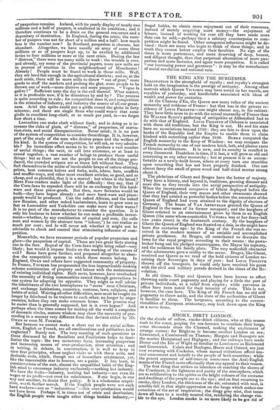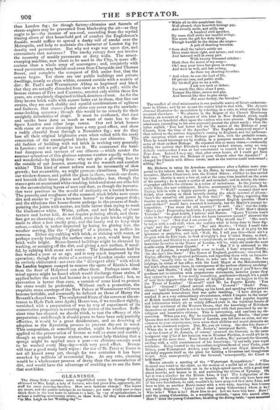SMOKY, DIRTY LONDON.
Or the shoals of sallow, smoke-dried citizens, who at this season rush to the coast, gasping for sea-breezes to ventilate their lungs, sonic thousands cross the Channel, seeking the excitement of strange scenes : for Brighton is become another London on sea ; Gravesend, a Camberwell on 'Thames; Margate and Ramsgate are the marine Hampstead and Highgate ; and the railways have made Dover and the Isle of Wight as familiar to Londoners as Richmond and Greenwich. Calais and Boulogne, Havre and Ostend, are just now swarming with Cocknies, whose annual visitations afford mu- tual amusement and benefit to the people of both countries; while the potent argument of self-interest overcomes the Anti-English mania of the French more effectually than any appeal to their reason. The first thing that strikes us islanders on reaching the shores of the Continent, is the lightness and purity of the atmosphere, which are as exhilarating to the spirits as the bright colours of the costume and dwellings of the people are to the eye ; and on first returning to smoky, dirty London, the thickness of the air, saturated with soot, is sensibly felt in that slight oppression on the lungs which makes one conscious of the act of respiration ; the dingy gray mist, that tones down all hues to a muddy neutral tint, rendering the change visi- ble to the eye. London smoke is no more likely to be got rid of than London fog ; for though factory-chimnies and funnels of steam-engines may be prevented from blackening the air—as they ought to be—the incense of sea-coal, ascending from the myriad blazing altars of that household god of comfort the Englishman's fireside, would suffice to spread a dusky veil of smoke over the Metropolis, and help to maintain the character of London fog for density and permanence. But why not wage war upon dirt, and exterminate that nuisance ? The smoky canopy does not involve the necessity of muddy pavements or dirty walls. The street- sweeping machine, now about to be used in the City, is more effi- cacious than a whole army of scavengers ; and, conjointly with wood pavements, may banish mud even from Cheapside and Thames Street, and complete the conquest of filth under foot, that the sewers began. Yet there are our public buildings and private dwellings, mostly so clean within, covered outside with a mantle of dirt : St. Paul's and Westminster Abbey so begrimed and black that they are actually shrouded from view as with a pall ; while the bronze statues of PITT and CANNING, erected only within these few years, are completely disguised in black dominos ofsoot. As for the dirty brown brick walls with square holes cut in them, that line our streets, they are such shabby and squalid combinations of ugliness and foulness, that stucco plaster alone can cover up the unwhole- some-looking eyesores ; though this would be no remedy for their unsightly deformities of shape. It must be confessed, that dust and smoke have done as much as want of taste has to dis- figure London and other large towns. Our red brick houses with stone or stucco dressings have a very good effect, and show
a ruddy cheerful front through a November fog ; nor do they lose all their original brightness even when veiled with the sooty
concretion of the emancipated blacks from our chimnies. The old fashion of building with red brick is reviving very generally in London ; and we are glad to see it. We counteract the habi- tual dampness and rawness of our climate — which render the
summer splendour of this glorious autumn weather equally welcome and wonderful—by blazing fires: why not give a glowing face to the outside of our houses, answering to the warmth and comfort
within ? This kind of street reform must be necessarily of slow growth ; but meanwhile, we might promote cleanliness. We paint our window-frames, and polish the glass in them, varnish our doors,
and burnish their brass plates and bell-handles • but, though the stucco gets an occasional white-washing, brick anistone are alike left
to the accumulating layers of soot and dust, as though the incrusta- tion were precious as the mould of antiquity on a buried bronze. The porosity and roughness of the common stock bricks soon cause dirt and smoke to " give a browner horror" to their pauper drab ; and the ablutions that house-fronts undergo in the process of fresh- pointing the joints with mortar, are little better than trying to wash
the blackamoor white. White, yellow, and red bricks, of closer
texture and better laid, do not require pointing afresh, and there- fore get no cleansing; else, we think, even the pale bricks might be
made to show a less smoky gray, and the hearty red to keep their
colour,—which is rather improved by losing its glaring hue, the weather serving, like the " glazing" of a picture, to mellow its rawness. Either dry-rubbing with brick, or sluicing with water, or perhaps merely brushing the surface once a year, would keep fine brick walls bright. Stone-fronted buildings might be cleansed by washing, or scraping off the dirt, and giving a new surface, if need- ful, by rubbing with stone and water. The Mansionhouse had its face washed a year or so ago, and is very much improved by the operation; though the stains of a century of London smoke cannot
be entirely obliterated : not even the " detergent elixir" with which the London bagman essayed to remove the spots of Rizzio's blood from the floor of Holyrood can efface them. Perhaps some che-
mical agents might be found which would discharge these stains, if applied before the soot had become in a manner fossilized ; but, as prevention is better than cure, a varnish of some kind to protect the stone would be preferable. Without such a protection, the exquisite stone carvings of the New Palace at Westminster will soon become invisible, and eventually be defaced as those of Henry the Seventh's chapeiwere. The sculptured frieze of the screen at the en- trance to Hyde Park next Apsley House was, if we recollect rightly,
varnished with a preparation of wax by way of experiment of its conservative properties in resisting the action of the weather. Suffi-
cient time has elapsed, we should think, to test the efficacy of this preparation ; and though it should prove to have been only partially effective, it would be a great desideratum, and as deserving of adoption as the Kyanizing process to prevent dry-rot in wood.
This composition, or something similar, might be advantageously applied to the preservation of bronze as well as stone and marble ; though as regards bronze statues, we cannot help thinking that a
sponge might be applied once a year—as chimney-sweeps used to be washed every May-day—with very good effect. Bronze will bear a good many bard wipes : the toe of St. Peter at Rome is not all kissed away yet, though for two centuries it has been smacked by millions of reverential lips. At any rate, cleaning would be a wholesomer process of decay than the accumulation of dirt, and would have the advantage of enabling us to see the form that soot hides.



























 Previous page
Previous page